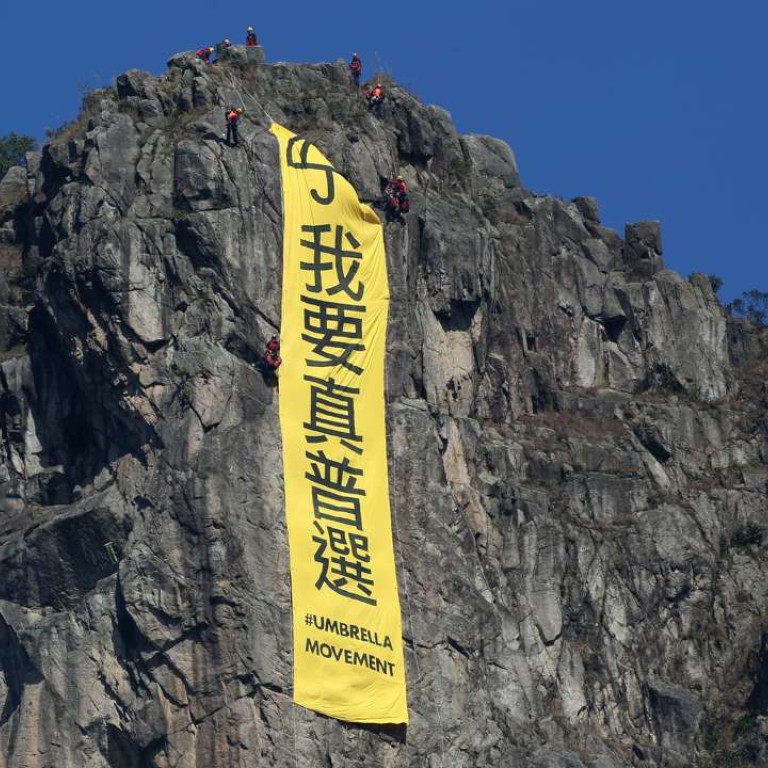
Why democracy in Hong Kong is the best choice for Beijing
Jack A. Goldstone says as discontent simmers, the only real choice for central government officials is which kind of democracy the city will get – peaceful and orderly, or tumultuous and chaotic
Democracy can be an orderly expression of public preferences to guide government in being responsible to the needs of citizens. Democracy can also be tumultuous chaos, with street protests, feuding factions in government, and repeated confrontations provoking extremist responses.
Officials in Beijing think of democracy in the latter terms, and like to think they can persuade Hong Kong to instead choose a more limited, guided form of government without a fully democratic contest for the chief executive.
Yet they are mistaken; the only real choice they have for Hong Kong is which kind of democracy they will get.
Hong Kong is a highly literate, educated, politically aware society with guarantees under the Basic Law for “freedom of speech, of the press and of publication; freedom of association, of assembly, of procession and of demonstration” (Article 27). The most complete acceptance of the “one country, two systems” principle will not change this.
Any such society is going to give rise to voices calling attention to social issues and problems. In Hong Kong, those issues include inequality, access to higher education, the availability of high-paying professional jobs for Hong Kong graduates, pensions for the elderly, air and water quality, the costs and quality of housing, the need to diversify the economy, and the management of mega construction projects such as the high-speed rail link to Guangzhou and the bridge to Macau.
In regard to all these issues, a society like that in Hong Kong is going to face public demands that the government institute policies that recognise these problems and develop solutions.

Postmortems: two Hong Kong groups to release studies on 2014 Occupy protests
If people believe that their government is responsible and accountable to them, and serves them by responding to their concerns, they will follow peaceful and institutional democratic procedures to shape government policies and choose government leaders. Yet if they do not believe that their government is responsible and accountable to them, or that leaders care about their needs, then they are likely to choose the more tumultuous forms of democracy, using protests and confrontations to change the agenda and insist that government leaders pay attention.
If those confrontations produce no results, then the next steps are more extremist demands and actions, including calls to remove government leaders and change the very structure of government.

Guilty: Hong Kong student leader Joshua Wong and associates could face jail over protest that sparked 79-day Occupy turmoil
In the past two years, Hong Kong has seen the results of Beijing’s insistence that the people of Hong Kong not choose their chief executive, and put up with a government that they feel is not responding to their needs. The outcome, unsurprisingly, has been street protests, feuding factions in government, and repeated confrontations provoking extremist responses.
Whereas two years ago, calls for Hong Kong independence were not visible, and no radical or extremist parties existed, today such calls are increasingly widespread and radical parties have arisen to contest the upcoming Legislative Council election.

Out of the ashes: three months on, how will Mong Kok riot change Hong Kong?
That can hardly be what Beijing wanted, but it is exactly the form of democracy they have chosen, by frustrating the transition to a more orderly and institutionalised form of fully democratic governance. Research has repeatedly shown that while full democracy is one of the most stable forms of governance, partial and factionalised democracy is one of the most unstable and chaotic.
By trying to limit democratic development in Hong Kong, Beijing is getting exactly what it had sought to avoid, a more unstable, less harmonious, and more extremist politics.
If “one country, two systems” is going to work effectively to provide harmony and stability in Hong Kong, then Hong Kong’s system must be allowed to develop according to its own logic and its own needs. Letting Hong Kong’s democracy develop fully is the only way for Beijing to achieve its own goals.
Jack A. Goldstone is Elman Family Professor of Public Policy and director of the Institute for Public Policy at the Hong Kong University of Science and Technology, and a global fellow at the Woodrow Wilson International Centre for Scholars. The views expressed here are solely those of the author
